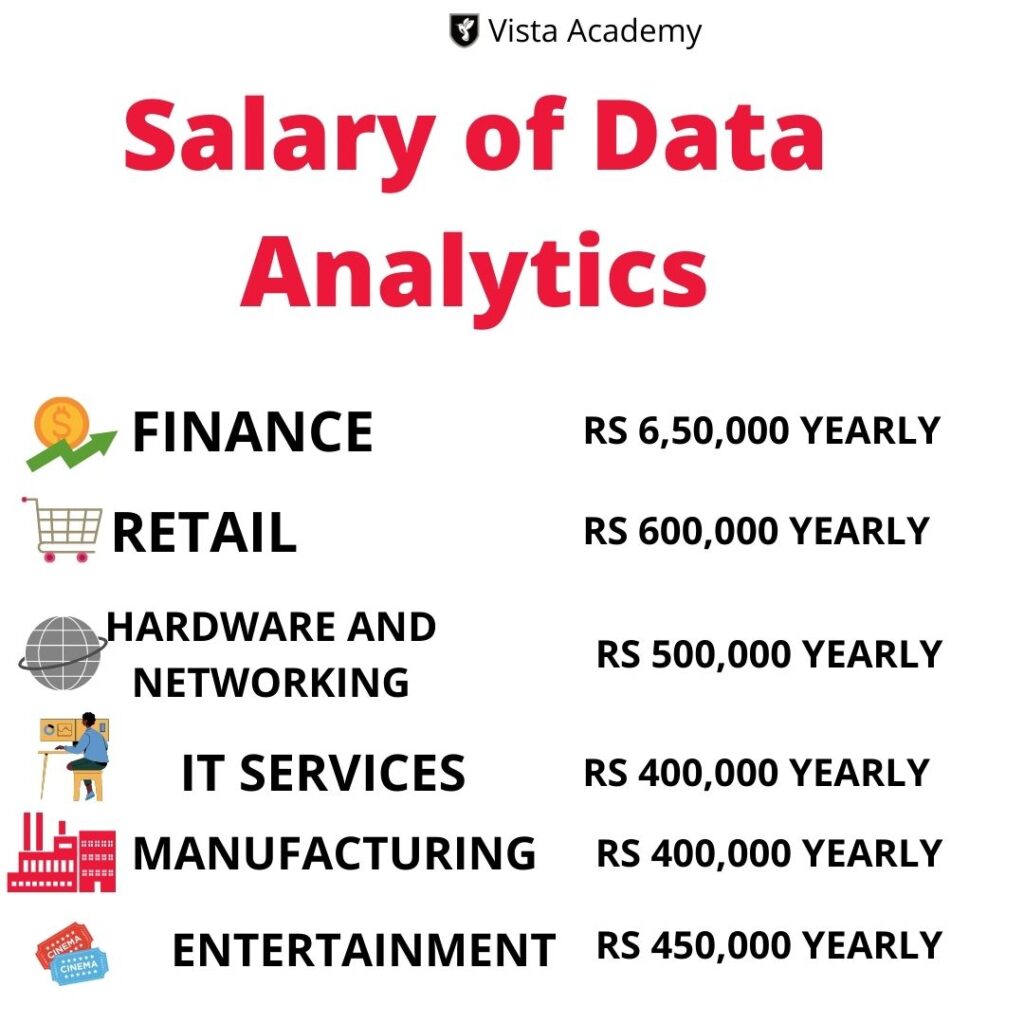Best Data Analytics course in Dehradun
Table of Contents
ToggleWhat is data analytics ?
Data analytics is the pursuit of extracting which means from raw information the use of specialised computer systems. These structures transform, organize, and model the data to draw conclusions and discover patterns.
How to Become a Data Analyst
Who is data analyst ?
Data Analyst career guide is intended to help you take the first steps toward a lucrative career in data analysis. Read on to find out what data analytics involves.
Is Data Analytics Hard to Learn?
Data analysis might be more difficult to master than other disciplines in technology since the abilities required to perform Data Analyst positions can be extremely technical. However, with the present global lack of data specialists, the function of Data Analyst is in high demand, which means more income and more job stability. According to a 2017 IBM study, demand will increase by another 28% by 2020, resulting in 364,000 more jobs (bringing the total to 2.7 million).
How Long Does It Take to Become a Data Analyst?
It can take anywhere from 10 weeks to four years to learn the skills required to become a Data Analyst.
This wide variety is due to the fact that there are numerous paths to become a good Data Analyst. Many data professionals have traditionally started with a bachelor’s degree in computer science (the four-year route), but it’s becoming more typical for Data Analysts to land jobs immediately from data analytics bootcamps and courses, which can be finished in as little as 10 weeks.
How Long Does It Take to Learn Python for Data Analysis?
Learning Python programming for data analysis can take anywhere from five to ten weeks, depending on your previous expertise with computer languages and web development.
Python, on the other hand, is noted for its readability and ease of use, making it a good choice for beginners. It’s also simple to install and run the language from any location on your machine, making it simple to learn on your own.

Is it Worth It to Take a Data Analytics Course?
Yes, data analytics courses are becoming increasingly valuable investments that can assist you in mastering relevant programming languages such as Python. These accelerated courses have a number of advantages over traditional four-year degrees, including greater hands-on learning and targeted skill development.
Furthermore, the demand for data experts has never been stronger, and it is projected to continue to rise in the future. Employers reward up-to-date data training in their existing staff, ensuring that they stay up with the pace of change, in addition to the millions of new data analytics positions that are being created.
Data professions already pay well compared to other tech jobs, but even if you’re already in the sector, expanding your skill set and earning additional specialities might help you advance your career.
How Much Do Data Analysts Make?

The average income for a Data Analyst in the United States is $75,456, with Senior Data Analysts earning $96,852. Making the shift from Data Analyst to Data Scientist can increase this amount even more: annual compensation in the data science sector as a whole averages $100,000.
However, in some fields, even Junior Data Analysts can meet that standard; according to a recent Springboard study, Data Analysts in natural resources and mining can expect salaries north of $100,000, while those in professional, scientific, and technical services can expect to earn an average of $90,000. The average salary in the banking and insurance industry is over $90,000, which equates to almost 400,000 positions.

Is Data Analytics a Good Career?
Yes, data analytics is a lucrative profession. Simply put, there has never been a more exciting time to work with data. Every day, 2.5 quintillion bytes of data are created, and the rate is only increasing. As organisations’ data collecting develops in extent and sophistication, it’s unavoidable that they’ll want to make use of it, and Data Analysts are at the vanguard of this movement.
High demand for Data Analysts is matched by a rise in pay—even in junior jobs, many Data Analysts’ incomes are comfortably above $70,000, with senior and highly specialised roles usually exceeding $100,000.
Aside from the high demand and corresponding pay, Data Analysts enjoy the following advantages.
Aside from the high demand and corresponding income, Data Analysts have the ability to collaborate and contribute to the highest levels of decision-making, which can lead to opportunities for advancement into more managerial positions. Many Data Analysts also appreciate the freedom to travel, work remotely, and relocate, even globally. The nature of the work itself may or may not be a good fit for the individual, but the pay, benefits, and job stability are all significant.
THE FIVE STAGES OF DATA ANALYSIS
The energy of data is maybe best caught in Moneyball. The book and ensuing film recounts the tale of Billy Beane, the incredible well known chief of the Oakland Games who utilized measurable assessment to rehash the game of baseball. With one of the association’s littlest spending plans, Beane depended on data to foresee the number of runs a member would rating and afterward constructed a program of underestimated yet skilled players to contend towards rivals with more profound pockets.
Spoiler alert: it worked. A little while after they embraced this methodology, the Oakland A’s begun to win large. They even turned into the principal group in more than 100 years of American Association baseball to dominate 20 back to back matches.
Need to come to be a records researcher or measurements investigator yourself? Our 12-week Data Science Bootcamp can set you up for another profession.
Quick forward quite a while, and you’d be unable to find a venture that isn’t making a difference Moneyball-like techniques to go with more intelligent choices. Broadcast communications organizations are observing calls to refine their clients’ insight. Medical care specialists are utilizing it to foster a more profound enthusiasm for victims and in the long run further develop results. Media supplier sellers are going to realities not exclusively alter content yet additionally produce totally new shows for watchers. The instances of ventures the utilization of measurements are really boundless.
While organizations have more noteworthy measurements than at any other time, people who have what it takes to put it to positive use are interesting. The results? Lost income, upset clients, separated representatives to recognize a couple.
The precise news is that there’s a simple five-venture framework that can be seen to separate experiences from data, see new open doors, and power development. Furthermore, even better, the ability to do so isn’t restricted to insights researchers or math prodigies. Individuals across all disciplines and at all levels of their professions can support the abilities to examine data. It’s valuable whether one is looking to upskill in a vocation or go into an absolutely new industry.
Is Data Analytics in Demand?
Yes, there is a high demand for data analytics. Before the end of 2020, IBM anticipated that the number of positions for data professionals in the United States would increase by 364,000 (to 2,720,000). Other sources support the trend of corporations investing heavily in big data; according to a recent survey by Dresner Advisory Services, enterprise big data usage increased from 17 percent in 2015 to 59 percent in 2018.
It’s not just tech corporations that are joining on board. Data analysis abilities can be applied in a variety of businesses. Big-data analytics adoption was highest in telecommunications (95 percent adoption), insurance (83 percent adoption), and advertising (77 percent adoption), followed by financial services (71 percent adoption), healthcare (64 percent adoption), and technology (58 percent adoption), and was most often used in research and development (75 percent) (63 percent).
As data analytics becomes more widely used, the scope of its applications expands—in fact, entire industries are on the verge of being completely transformed by big data. A recent McKinsey analysis predicted how digital analytics will revolutionise marketing, operations, and manufacturing, with the promise of data-activated, one-to-one marketing engagements. This promise has yet to be completely realised in a number of industries. According to another McKinsey report, the US healthcare industry could generate more than $300 billion in value if it used big data to improve efficiency and quality, and a large retailer employing big data to its full potential could increase its operating margin by more than 60%. To put it another way, we don’t see this trend slowing down anytime soon.
How to Become a Data Analyst (with or Without a Degree)
Data analysts collect, clean, and analyse data to aid in the making of business choices. If you’re thinking about pursuing a career in this in-demand profession, here’s how to get started:
- Obtain a basic education.
- Develop your technical abilities
- Work on real-world initiatives.
- Create an online portfolio of your work.
- Practice giving a presentation of your findings.
- Get a career as a data analyst at the beginning level.
- Consider obtaining a certification or obtaining an advanced degree.
- Let’s look at each of those seven processes in more detail.
Obtain a basic education.
If you’re new to the field of data analysis, you should begin by learning the basics. Getting a thorough understanding of data analytics will help you decide if this is the right career for you while also providing you with marketable abilities.
Most entry-level data analyst employment used to require a bachelor’s degree. While many jobs still require a bachelor’s degree, this is starting to change. While a degree in math, computer science, or another comparable field might help you gain basic knowledge and improve your CV, you can also learn what you need through alternative programmes such as professional certificate programmes, bootcamps, or self-study courses.
Develop your technical abilities.
Getting a job in data analysis usually necessitates a set of specialised technical abilities. These are some essential abilities you’ll likely need to get hired, whether you’re learning through a degree programme, a professional credential, or on your own.
- Statistics
- Programming in R or Python’
- SQL (Structured Query (Structured Query Language)
- Visualization of data
- Cleaning and preparing data
- Examine some job postings for positions you’d like to apply for, and concentrate your studies on the programming languages or visualisation tools that are specified as requirements.
In addition to these hard capabilities, hiring managers look for soft skills such as strong communication skills—you might be expected to communicate your findings to those who don’t have as much technical expertise—problem-solving ability, and domain knowledge in the field you want to work in.
Work on projects with real data
Working with data in practical contexts is the best approach to discover its worth. Keep an eye out for degree programmes or courses that feature practical assignments using actual data sets. Various free public data sets are also available for you to use in the creation of your own projects.
Create your work into a portfolio.
Save your best work for your portfolio as you experiment with online data sets or finish practical homework in your classroom. Hiring managers can see your skills in a portfolio. Having a solid portfolio can help you land the job.
As you begin to select work for your portfolio, pick initiatives that show off your aptitude for:
- collect information from various sources
- Data cleaning and normalization
- Use graphs, charts, maps, and other visuals to illustrate your findings.
- Get valuable knowledge from the data.
Consider certification
As your career as a data analyst progresses, think about how you’d like to advance and what other credentials can help you get there. Your ability to qualify for more advanced positions at higher pay grades may be aided by certifications from Vista Academy.
Network
To find your next job, maximise your network. Keep your abilities and certifications current on all of your professional social media platforms. Inform your loved ones, close friends, and colleagues that you are seeking for work. Relate to others. Although you should check out ads blindly, networking is a more effective way to access the hidden job market.
Communication Skills are Extremely Important for a Data Analyst
The results of data analysis are likely to be intricate and challenging to comprehend. The most important aspect of being a data analyst, however, is communicating your approaches to the non-technical staff. You must be able to analyse data, tell compelling stories, and perform other related tasks. Writing, presenting, and communicating in general are crucial skills for data analysts.

Join Vista Academy for Data analytics Training
You might think about enrolling in data analytics training at Vista Academy for a number of reasons. Here are a few possible benefits:
Expertise and Curriculum:
Data analytics training is a speciality of Vista Academy. A group of knowledgeable instructors who are up to date on all the different data analytics strategies, tools, and procedures may be available to them. They may have a broad range of topics in their curriculum, guaranteeing you get a well-rounded education in data analytics.
Practical Approach
Vista Academy might place a strong emphasis on learning through application. To provide you with experience with data analytics values in the real world, they might include hands-on activities, case studies, and real-world projects. You can acquire the abilities needed to deal with issues in data analytics in the real world by using this method.
Industry-Relevant Skills:
The academy might concentrate on educating students in areas of high demand in the labour market. Organisations from all industries are increasingly relying on data-driven decision-making, which is a field that is quickly expanding. By enrolling in Vista Academy, you might acquire the abilities and information required to succeed in the data analytics job market and raise your employability.
Networking Opportunities
Vista Academy might offer chances for networking with former students, graduates, and business leaders. For potential future partnerships, employment prospects, and mentoring, developing a strong professional network might be beneficial.
Career Support
You may be able to get career support services from Vista Academy to help with your job hunt. This could be help with job placement, interview preparation, resume writing, or access to their network of potential employers. Such assistance may help you land a job or advance in the data analytics industry.
Flexibility and Convenience
Vista Academy may offer flexibility in terms of class scheduling, depending on the structure of their programme, enabling you to match your training with other responsibilities.
the curriculum of the Data Analytics course at Vistashikha Solutions Pvt Ltd is designed to cover fundamental and advanced topics in data analytics. It includes modules on data preprocessing, statistical analysis, machine learning, data visualization, and real-world projects to apply these skills.
Yes, the course at Vistashikha Solutions Pvt Ltd combines theoretical knowledge with practical exercises. Students engage in hands-on activities to reinforce concepts learned in lectures, ensuring a well-rounded learning experience
The instructors at Vistashikha Solutions Pvt Ltd are experienced professionals in the field of data analytics. They have a strong educational background and practical industry experience, which ensures that students receive quality instruction.
The course duration is [insert duration], and the institute offers flexibility in study schedules to accommodate working professionals and students with various commitments.
While no specific background is required, having a basic understanding of programming and mathematics can be beneficial for grasping the course content more effectively.
Throughout the course, students will learn to work with popular data analytics tools such as Python, R, and relevant libraries. The curriculum also covers database querying and data visualization using tools like pandas, Matplotlib, and more.
Yes, the course integrates real-world projects and case studies to provide practical exposure. These projects mirror industry scenarios, allowing students to apply their knowledge to solve authentic data analysis challenges.
Vistashikha Solutions Pvt Ltd offers career support through job placement assistance, resume building, and interview preparation. The institute leverages its industry connections to help students secure relevant job opportunities.
The fee structure for the Data Analytics course can be obtained by contacting Vistashikha Solutions Pvt Ltd directly. They may offer various payment plans or options for the convenience of their students.

